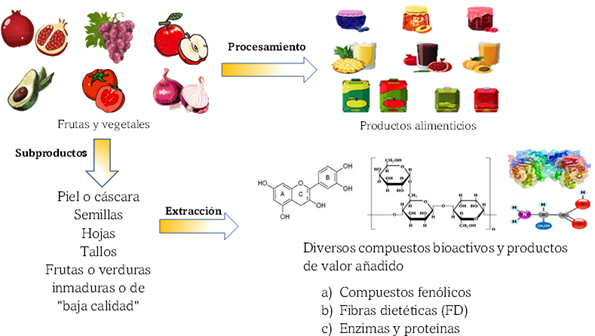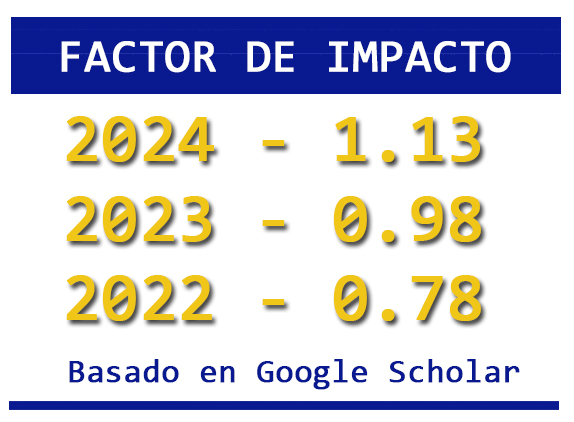Learning to Revalue By-Products and their Application in Meat Products
DOI:
https://doi.org/10.36790/epistemus.v16i33.227Keywords:
By-products, Revaluation, Natural additives, Antioxidants, Functional foodAbstract
One of society's major problems today is the enormous amount of waste generated by the agri-food industry. These by-products, which still contain potentially valuable compounds, can represent a new source of renewable resources as food additives. This may allow the establishment of sustainable development initiatives to mitigate environmental problems and, at the same time, develop products with improved nutritional value. Recently, it has been searched included more natural ingredients and preservatives in food production. In the meat industry, there is a particular problem of decomposition and oxidation of products. The objective of this article is to publicize the work being done in food science to improve the processing and quality of meat products through the use of by-products.
Downloads
References
FAO, The state of food security and nutrition in the world 2019: safeguarding against economic slowdowns and downturns. Rome: Food and Agriculture Organization of the United Nations (FAO, 2019.
N. A. Sagar, S. Pareek, S. Sharma, E. M. Yahia, and M. G. & Lobo, “Fruit and vegetable waste: Bioactive compounds, their extraction, and possible utilization.,” Compr. Rev. Food Sci. Food Saf., vol. 17 (3), pp. 512–531, 2018, doi: https://doi.org/10.1111/1541-4337.12330. DOI: https://doi.org/10.1111/1541-4337.12330
M. Faustino, M. Veiga, P. Sousa, E. M. Costa, S. Silva, and M. Pintado, “Agro-food byproducts as a new source of natural food additives,” Molecules, vol. 24, no. 6, pp. 1–23, 2019, doi: 10.3390/molecules24061056. DOI: https://doi.org/10.3390/molecules24061056
A. K. Das et al., “A comprehensive review on antioxidant dietary fibre enriched meat-based functional foods,” Trends Food Sci. Technol., vol. 99, no. September 2019, pp. 323–336, 2020, doi: 10.1016/j.tifs.2020.03.010. DOI: https://doi.org/10.1016/j.tifs.2020.03.010
K. Kumar, Nutraceutical potential and utilization aspects of food industry by-products and wastes. INC, 2020. DOI: https://doi.org/10.1016/B978-0-12-817121-9.00005-X
P. Selvakumar, P., & Sivashanmugam, “Studies on the extraction of polyphenolic compounds from pre-consumer organic solid waste,” J. Ind. Eng. Chem., vol. 82, pp. 130–137, 2020, doi: https://doi.org/10.1016/j.jiec.2019.10.004. DOI: https://doi.org/10.1016/j.jiec.2019.10.004
M. Araneda, “Carnes y derivados. Composición y propiedades.,” Edualimentaria, 2022. https://www.edualimentaria.com/carnes-cecinas-composicion-propiedades (accessed Jul. 11, 2022).
FAO, “Carne y Productos Cárnicos.,” Departamento de Agricultura y Protección del Consumidor, Producción y Sanidad Animal, 2019. https://www.fao.org/ag/againfo/themes/es/meat/home.html (accessed Apr. 26, 2022).
M. Calderón-Oliver and L. H. López-Hernández, “Food Vegetable and Fruit Waste Used in Meat Products,” Food Rev. Int., vol. 00, no. 00, pp. 1–27, 2020, doi: 10.1080/87559129.2020.1740732. DOI: https://doi.org/10.1080/87559129.2020.1740732
K. Bhardwaj et al., “Fruit and Vegetable Peel-Enriched Functional Foods : Potential Avenues and Health Perspectives,” Evidence-based Complement. Altern. Med., vol. 2022, no. Natural Products and Herbal Medicine: Safety, Efficacy, and Bioactivity, 2022, doi: https://doi.org/10.1155/2022/8543881. DOI: https://doi.org/10.1155/2022/8543881
J. Bedrníček et al., “Onion waste as a rich source of antioxidants for meat products,” Czech J. Food Sci., vol. 37, no. 4, pp. 268–275, 2019, doi: 10.17221/68/2018-CJFS. DOI: https://doi.org/10.17221/68/2018-CJFS
H. S. Zaki, N. L., Abd-Elhak, N. A., & Abd El-Rahman, “The Utilization of Yellow and Red Onion Peels and Their Extracts as Antioxidant and Antimicrobial in Preservation of Beef Burger during Storage.,” Am. J. Food Sci. Technol., vol. 10, no. 1, pp. 1–9, 2022, doi: 10.12691/ajfst-10-1-1.
P. Sharma and S. Yadav, “Effect of Incorporation of Pomegranate Peel and Bagasse Powder and Their Extracts on Quality Characteristics of Chicken Meat Patties,” Food Sci. Anim. Resour., vol. 40, no. 3, pp. 388–400, 2020. DOI: https://doi.org/10.5851/kosfa.2020.e19
S. S. Turgut, A. Soyer, and F. Işıkçı, “Effect of pomegranate peel extract on lipid and protein oxidation in beef meatballs during refrigerated storage,” Meat Sci., vol. 116, pp. 126–132, 2016, doi: 10.1016/j.meatsci.2016.02.011. DOI: https://doi.org/10.1016/j.meatsci.2016.02.011
S. S. Turgut, F. Işıkçı, and A. Soyer, “Antioxidant activity of pomegranate peel extract on lipid and protein oxidation in beef meatballs during frozen storage,” Meat Sci., vol. 129, pp. 111–119, 2017, doi: 10.1016/j.meatsci.2017.02.019. DOI: https://doi.org/10.1016/j.meatsci.2017.02.019
I. M. Trujillo-Mayol, I., Sobral, M. M. C., Viegas, O., Cunha, S. C., Alarcón-Enos, J., Pinho, O., & Ferreira, “Incorporation of avocado peel extract to reduce cooking-induced hazards in beef and soy burgers: A clean label ingredient.,” Food Res. Int., vol. 147, no. 110434, 2021, doi: https://doi.org/10.1016/j.foodres.2021.110434. DOI: https://doi.org/10.1016/j.foodres.2021.110434
T. T. Tran, T. T. T., Ton, N. M. N., Nguyen, T. T., Sajeev, D., Schilling, M. W., & Dinh, “Application of natural antioxidant extract from guava leaves (Psidium guajava L.) in fresh pork sausage.,” Meat Sci., vol. 165, p. 108106, 2020, doi: https://doi.org/10.1016/j.meatsci.2020.108106. DOI: https://doi.org/10.1016/j.meatsci.2020.108106
M. Balaban, C. Koc, T. Sar, and M. Y. Akbas, “Antibiofilm effects of pomegranate peel extracts against B. cereus, B. subtilis, and E. faecalis,” Int. J. Food Sci. Technol., vol. 56, no. 10, pp. 4915–4924, 2021, doi: 10.1111/ijfs.15221. DOI: https://doi.org/10.1111/ijfs.15221
D. Fredotović, Ž., Puizina, J., Nazlić, M., Maravić, A., Ljubenkov, I., Soldo, B., ... & Bajić, “Phytochemical characterization and screening of antioxidant, antimicrobial and antiproliferative properties of Allium× cornutum clementi and two varieties of Allium cepa L. peel extracts.,” Plants, vol. 10, no. 5, p. 832, 2021, doi: https://doi.org/10.3390/plants10050832. DOI: https://doi.org/10.3390/plants10050832
M. Aziz and S. Karboune, “Natural antimicrobial/antioxidant agents in meat and poultry products as well as fruits and vegetables: A review,” Crit. Rev. Food Sci. Nutr., vol. 58, no. 3, pp. 486–511, 2018, doi: 10.1080/10408398.2016.1194256. DOI: https://doi.org/10.1080/10408398.2016.1194256
D. López-Romero et al., Evidence of some natural products with antigenotoxic effects. Part 2: Plants, vegetables, and natural resin, vol. 10, no. 12. 2018. DOI: https://doi.org/10.3390/nu10121954
J. So, S., Uriyapongson, S., & Uriyapongson, “Effects of dried tomato waste powder levels on lycopene content, lipid oxidation, color, antioxidant activity, and sensory properties of frankfurter sausage made from Thai native beef.,” Songklanakarin J. Sci. Technol., vol. 42, no. 1, pp. 27–34, 2020, [Online]. Available: https://www.thaiscience.info/Journals/Article/SONG/10993038.pdf.
M. Ghafouri-Oskuei, H., Javadi, A., Asl, M. R. S., Azadmard-Damirchi, S., & Armin, “Quality properties of sausage incorporated with flaxseed and tomato powders.,” Meat Sci., vol. 161, p. 107957, 2020, doi: https://doi.org/10.1016/j.meatsci.2019.107957. DOI: https://doi.org/10.1016/j.meatsci.2019.107957
S. J. V. Vicente, G. R. Sampaio, C. K. B. Ferrari, and E. A. F. S. Torres, “Oxidation of Cholesterol in Foods and Its Importance for Human Health,” Food Rev. Int., vol. 28, no. 1, pp. 47–70, 2012, doi: 10.1080/87559129.2011.594972. DOI: https://doi.org/10.1080/87559129.2011.594972

Downloads
Published
How to Cite
Issue
Section
License
Copyright (c) 2022 EPISTEMUS

This work is licensed under a Creative Commons Attribution-NonCommercial-ShareAlike 4.0 International License.
The magazine acquires the patrimonial rights of the articles only for diffusion without any purpose of profit, without diminishing the own rights of authorship.
The authors are the legitimate owners of the intellectual property rights of their respective articles, and in such quality, by sending their texts they express their desire to collaborate with the Epistemus Magazine, published biannually by the University of Sonora.
Therefore, freely, voluntarily and free of charge, once accepted the article for publication, they give their rights to the University of Sonora for the University of Sonora to edit, publish, distribute and make available through intranets, Internet or CD said work, without any limitation of form or time, as long as it is non-profit and with the express obligation to respect and mention the credit that corresponds to the authors in any use that is made of it.
It is understood that this authorization is not an assignment or transmission of any of your economic rights in favor of the said institution. The University of Sonora guarantees the right to reproduce the contribution by any means in which you are the author, subject to the credit being granted corresponding to the original publication of the contribution in Epistemus.
Unless otherwise indicated, all the contents of the electronic edition are distributed under a license for use and Creative Commons — Attribution-NonCommercial-ShareAlike 4.0 International — (CC BY-NC-SA 4.0) You can consult here the informative version and the legal text of the license. This circumstance must be expressly stated in this way when necessary.
The names and email addresses entered in this journal will be used exclusively for the purposes established in it and will not be provided to third parties or for their use for other purposes.























